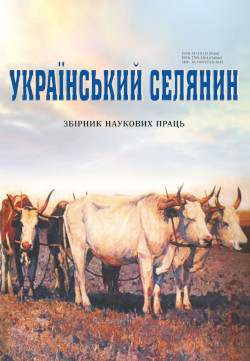Grain export from Ukraine: assessment of the potential during peace negotions in Brest-Litovsk
Main Article Content
Abstract
The purpose of the research is to define how much grain, according to the calculations of German and Ukrainian
government experts, Ukraine could have exported in the first half of 1918.
The scientific novelty of the research is seen in the fact that for the first time in historical science, actual material on the
topic is systematized and analyzed, conclusions and generalizations are reasoned.
Consideration of the topic leads to the following conclusions. Until 1914, Ukrainian provinces within the Russian Empire
produced about 19 million tons of grain annually, of which 4.8 to 5 million tons were exported outside the empire. During the
First World War (1914 – 1917), grain production in Ukraine decreased and there was less export. According to the estimates of
the German side, Ukrainian stocks of export grain at the beginning of 1918 had from 2 to 8 million tons, and according to the
data of the Ukrainian side, it was from 1 to 3.3 million tons. Based on these calculations, at the negotiations in Brest-Litovsk,
Ukrainian, Austro-Hungarian and German delegates agreed that Ukraine was able to sell Germany and Austria-Hungary 1
million tons of grain by July 31, 1918. These obligations of the Ukrainian side were recorded in peace treaty of February 9,
1918 and in the protocol of February 7, 1918, which supplemented the peace treaty
Article Details

This work is licensed under a Creative Commons Attribution 4.0 International License.
References
Dornik, V. (Ed.). (2015) Ukraina mizh samovyznachenniam ta okupatsiieiu: 1917–1922 roky
[Ukraine between self-determination and occupation: 1917–1922]. Kyiv: Nika-Tsentr. [in Ukrainian].
Chernev, B. (2017). Twilight of Empire. The Brest-Litovsk Conference and the Remaking of
East-Central Europe, 1917–1918. Toronto, Buffalo, London: University of Toronto Press. [in English].
Der Friede von Brest-Litowsk vom 3. März 1918 mit Russland und der sog. Brotfrieden vom
Februar 1918 mit der Ukraine. Die vergessene Frieden: 100 Jahre später in der Blickpunkt gerückt
/ Hgb. von G.H. Gornig und A. Eisfeld. Berlin: Duncker & Humblot. (2020). [in German].
Verstiuk, V. (Ed.). (2018). Ukraina ta Nimechchyna: mizhderzhavni vidnosyny: zbirnyk naukovykh prats [Ukraine and Germany: interstate relations: collection of scientific papers]. Chernihiv:
Siverskyi tsentr pisliadyplomnoi osvity, [in Ukrainian].
Bryunin, V. G. (1965). Vnutripoliticheskaya borba v Germanii letom i osenyu 1917 goda [Internal political struggle in Germany in summer and autumn of 1917]. Leningrad: Izdatelstvo LGU. [in
Russian].
Bobylieva, S. Y. (2003). Istoriia Nimechchyny z davnikh chasiv do 1945 roku [History of
Germany from ancient times to 1945]. Dnipropetrovsk: RVV DNU. [in Ukrainian].
Geschichte der Weltwirtschaft im 20 Jahrhundert. Band 2: Hardach G. Der Erste Weltkrieg
(1973). München: DTV, 2. [in German].
Afflerbach H. Auf Messers Schneide. (2018). Wie das Deutsche Reich den Ersten Weitkrieg
verlor. München: Verlag C.H. Beck. [in German].
Archivalische Forschungen zur Geschichte der deutschen Arbeitsbewegung. (1959). Berlin:
Rütten u. Loening, 4/III, 925–1530. [in German].
Loewenfeld-Russ, H. (1926). Die Regelung der Volksernährung im Kriege. Wien: Hoelder,
Pichler, Tempsky A.G. ; New Haven : Yale University Press. [in German].
Das Werk des Untersuchungsausschusses der Deutschen Verfassunggebenden Nationalversammlung und des Deutschen Reichstages 1919 – 1928: Verhandlungen. Gutachten. Urkunden. IV
Reihe. Die Ursachen des Deutschen Zusammenbruchs im Jahre 1918. (1927). Berlin: Deutsche Verlagsgesellschaft für Politik und Geschichte, 3 [in German].
Sovetsko-germanskie otnosheniya ot peregovorov v Brest-Litovske do podpisaniya Rapallskogo dogovora: sbornik dokumentov [Soviet-German relations from the negotiations in Brest-Litovsk
to the signing of the Treaty of Rapallo: a collection of documents]. (1968). Moskva: Politizdat, 1. [in
Russian].
Treuenfels, B. (1920). Die Reste der russischen Volkswirtschaft. Stuttgart: Verlag von Ferdinand Enke. [in German].
Pavlenko, Yu. & Khramov Yu. (1995). Ukrainska derzhavnist u 1917–1919 rr. (istoryko-henetychnyi analiz) [Ukrainian statehood in 1917–1919. (historical and genetic analysis)]. Kyiv: Manuskrypt. [in Ukrainian].
Blücher, W. (1951). Deutschlands Weg nach Rapallo. Erinnerungen eines Mannes aus dem
zweiten Gliede. Wiesbaden: Limes Verlag. [in German].
Velsen, S. (1956). Deutsche Generalstabsoffiziere im 1. Weltkrieg 1914–1918. Erinnerungen
Die Welt als Geschichte, 3–4, 250–293. [in German].
Gratz, G. & Schüller, R. (1925). Die äußere Wirtschaftspolitik Österreich-Ungarns. Mitteleuropäische Pläne. Wien: Hoelder, Pichler, Tempsky A.G. [in German].
Kaiser Wilhelm II als Oberster Kriegsherr während des Ersten Weltkrieg – Quellen aus der
militärischen Umgebung des Kaisers 1914–1918. (2005). München: Oldenbourg. [in German].
Кrah germanskoi okkupatsii na Ukraini (Pо dokumentam okkupantov). [The collapse of the
German occupation in Ukraine (according to the documents of the occupiers)] (1936). Моskvа: Gosudarstvennoe isdatelstvo. [in Russian].
Kessler, H. (2006). Das Tagebuch: 1880–1937. Stuttgart: Cotta, 6. [in German].
Borowsky, P. (1970). Deutsche Ukrainepolitik 1918 (unter besonderer Berücksichtigung der
Wirtschaftsfragen). Lübeck; Hamburg. [in German].
Landwehr, O. Hunger. (1931). Die Erschöpfungsjahre der Mittelmächte 1917/18. Zürich,
Leipzig, Wien: Amalthea-Verlag. [in German].
Ereignisse in der Ukraine 1914–1922, deren Bedeutung und historische Hintergründe / Hgb.
von Th. Hornykiewicz. Philadelphia. (1967), 2. [in German].

